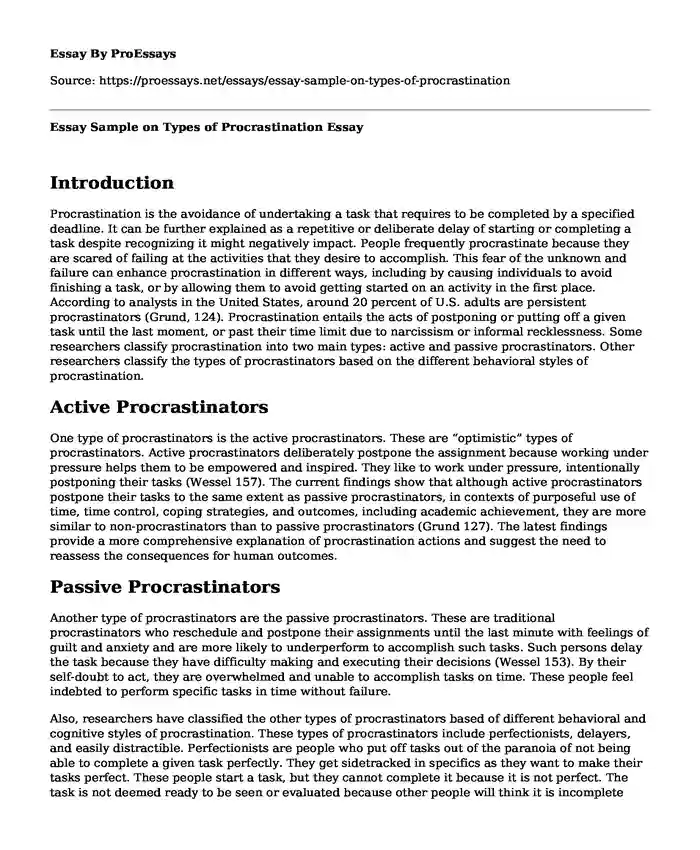Introduction
Procrastination is the avoidance of undertaking a task that requires to be completed by a specified deadline. It can be further explained as a repetitive or deliberate delay of starting or completing a task despite recognizing it might negatively impact. People frequently procrastinate because they are scared of failing at the activities that they desire to accomplish. This fear of the unknown and failure can enhance procrastination in different ways, including by causing individuals to avoid finishing a task, or by allowing them to avoid getting started on an activity in the first place. According to analysts in the United States, around 20 percent of U.S. adults are persistent procrastinators (Grund, 124). Procrastination entails the acts of postponing or putting off a given task until the last moment, or past their time limit due to narcissism or informal recklessness. Some researchers classify procrastination into two main types: active and passive procrastinators. Other researchers classify the types of procrastinators based on the different behavioral styles of procrastination.
Active Procrastinators
One type of procrastinators is the active procrastinators. These are “optimistic” types of procrastinators. Active procrastinators deliberately postpone the assignment because working under pressure helps them to be empowered and inspired. They like to work under pressure, intentionally postponing their tasks (Wessel 157). The current findings show that although active procrastinators postpone their tasks to the same extent as passive procrastinators, in contexts of purposeful use of time, time control, coping strategies, and outcomes, including academic achievement, they are more similar to non-procrastinators than to passive procrastinators (Grund 127). The latest findings provide a more comprehensive explanation of procrastination actions and suggest the need to reassess the consequences for human outcomes.
Passive Procrastinators
Another type of procrastinators are the passive procrastinators. These are traditional procrastinators who reschedule and postpone their assignments until the last minute with feelings of guilt and anxiety and are more likely to underperform to accomplish such tasks. Such persons delay the task because they have difficulty making and executing their decisions (Wessel 153). By their self-doubt to act, they are overwhelmed and unable to accomplish tasks on time. These people feel indebted to perform specific tasks in time without failure.
Also, researchers have classified the other types of procrastinators based of different behavioral and cognitive styles of procrastination. These types of procrastinators include perfectionists, delayers, and easily distractible. Perfectionists are people who put off tasks out of the paranoia of not being able to complete a given task perfectly. They get sidetracked in specifics as they want to make their tasks perfect. These people start a task, but they cannot complete it because it is not perfect. The task is not deemed ready to be seen or evaluated because other people will think it is incomplete (Holienka 1936). Perfectionists believe that they will be viewed as inexperienced by other individuals and will not trust them to perform such tasks again. These people require two more revisions to do a better job.
Delayers
The third type of procrastinators are delayers. These have a difficult time getting started on any assignment. They put things off for all sorts of reasons like exhaustion where individuals feel too weary, busyness where individuals feel they do not have time to do a given task right now, and self-indulgence. People feel that they need to relax. Also, these people usually have misplaced self-regard that triggers them to take breaks. They also have an inaccurate frame of mind whereby they do not feel like doing a given task at the moment (Holienka 1938). Delayers always experience late-day blues whereby they think it is too late to start a task right now; they usually promise to do such assignments the next day when they will be fresh. The easily distractible individuals often find something else to do that provides them immediate pleasure rather than the satisfaction accomplish the task would bring. The distractions often encompass games, eating, trolling, googling, or going to outside activities (Holienka 1940). These people are easily distracted from accomplishing their tasks by distractors that seem easier to undertake.
Conclusion
Conclusively, different types of procrastination have their inherent causes and consequences. The most substantial justification in existing literature derives upon task cautiousness and specific behavioral patterns like the inability to concentrate, as the likely reasons for procrastination. It is a prevalent human experience concerning postponement in daily tasks or even putting off pertinent tasks such as attending a meeting, presenting job descriptions and job specifications or educational tasks, or bringing up a strenuous issue with a spouse. Although usually portrayed as a detrimental feature because of its impeding influence on one’s efficiency, often correlated with depression, low self-esteem, remorse, and inadequacies, it can also be regarded a wise response to specific requirements that could produce risky or negative results or necessitate waiting for new information to arrive.
Works Cited
Grund, Axel, and Stefan Fries. "Understanding procrastination: A motivational approach." Personality and Individual Differences 121 (2018): 120-130.
Holienka, Marian, Peter Gál, and Zuzana Kovacicová. "Understanding student entrepreneurs: Doers, procrastinators, dreamers, and abstainers." Acta Universitatis Agriculturae et Silviculturae Mendelianae Brunensis 65.6 (2017): 1935-1944.
Wessel, Jason, Graham L. Bradley, and Michelle Hood. "Comparing effects of active and passive procrastination: A field study of behavioral delay." Personality and Individual Differences 139 (2019): 152-157.
Cite this page
Essay Sample on Types of Procrastination. (2024, Jan 01). Retrieved from https://proessays.net/essays/essay-sample-on-types-of-procrastination
If you are the original author of this essay and no longer wish to have it published on the ProEssays website, please click below to request its removal:
- Leadership Philosophy: Ethical Leadership and Decision Making Essay
- Paper Example on Crisis Text Line
- Adolescent Suicide: Ethics in Nursing Essay Example
- Essay Example on the Unfamiliar History of Dissociative Identity Disorder (DID)
- Essay Sample on Empathy Building Relationships
- Research Paper on Unwanted Photo Capturing: The Right to Privacy in a Digital Age
- Unlocking Language Acquisition: The Behaviorist Theory and Its Complements - Essay Sample







